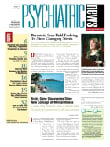The American Academy of Pediatrics recommends that all infants should be screened for autism between 18 and 24 months of age.
However, a new study suggests that such screening may be inaccurate for many preterm infants.
The study was conducted by Bonnie Stephens, M.D., an assistant professor of pediatrics at Brown University, and colleagues. They reported the results May 1 at the annual meeting of the Pediatric Academic Societies in Denver. (One of the sponsors of this meeting was the American Academy of Pediatrics.)
Many preterm infants screen positive for autism at 18 months. But Stephens and her colleagues suspected that quite a few of them actually do not have the disorder, but rather are showing these screening test results due to a cognitive or language delay that is unrelated to autism; such delays are common in premature infants at 18 months. They decided to test this hypothesis on 152 infants born before 28 weeks of gestation.
The infants were screened for autism both at 18 months and 30 months. The instruments used were the Pervasive Developmental Disorders Screening Test, Stage 2, and two items from the Autism Diagnostic Observation Schedule—response to name and response to joint attention. The infants were also evaluated with an instrument to assess preemies for cognitive and language delay—the Bayley Scales of Infant Development.
Eighteen percent of the infants screened positive for autism at 18 months, and 10 percent did so at 30 months. Moreover, only 3 percent of infants screened positive for autism at both time points, and a positive screen at either 18 months or 30 months was associated with cognitive and language delays.
Thus, many of the infants screening positive at 18 months, or perhaps even at 30 months, might have been false positives, probably due to language and cognitive delay, the researchers concluded.
Stephens and her team are now trying to get funding to conduct a multicenter trial of more than 500 preterm children. They hope that such a large study will help them determine the true rate of false positives or false negatives when prematurely born infants are screened at 18 months and at 30 months as well as the optimal time to screen for autism in this particular population. It could be that later screening and/or multiple screening data points could improve screening accuracy, they said.
"Early screening is still very helpful in identifying children at risk for expressive and receptive language delays and other developmental delays, even if not autism," Louis Kraus, M.D, told Psychiatric News. "Those children identified at risk then have reason for additional more comprehensive testing, including neuropsychological and speech." Kraus is a child and adolescent psychiatrist and autism expert at Rush University Medical Center.
